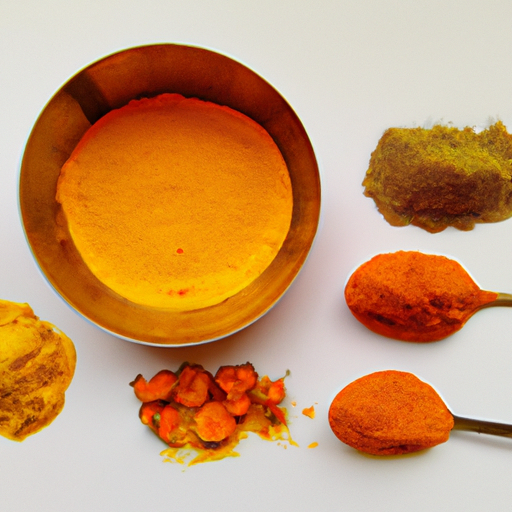As a person constantly searching for natural solutions to enhance my general well-being, I discovered Honey Chai Turmeric Tea. This delightful tea has swiftly become a regular part of my daily regimen, not just for its incredible taste, but also for the vast array of health advantages it offers.
Honey Chai Turmeric Tea is a blend of black tea, honey, chai spices, and turmeric. Each ingredient plays an important role in promoting good health and wellbeing. Black tea contains antioxidants and caffeine for energy and focus, while honey adds natural sweetness and antibacterial properties.
The chai spices – cinnamon, ginger, cardamom, cloves – provide numerous health benefits including anti-inflammatory effects. And finally, turmeric gives this tea its signature yellow color and provides powerful antioxidant properties to help combat free radicals.
In this article we will explore the many benefits of Honey Chai Turmeric Tea in more detail.
Key Takeaways
- Honey Chai Turmeric Tea is a natural remedy for improving overall health and wellbeing, containing black tea, honey, chai spices, and turmeric.
- Regularly drinking this tea can help boost immunity, aid digestion, reduce inflammation, and improve cognitive function and skin health.
- Turmeric, honey, and chai spices provide numerous health benefits such as anti-inflammatory effects, antibacterial properties, and metabolism-boosting properties.
- However, excessive consumption may lead to potential side effects, and individuals with allergies, gallbladder disease, kidney stones, liver disease, or who are pregnant or breastfeeding should avoid consuming turmeric. It’s also important to consult with a healthcare professional before regularly consuming this tea if you’re on any medication.
Overview of Honey Chai Turmeric Tea
Looking for a cozy and flavorful drink that also packs a health punch? Look no further than honey chai turmeric tea! This delicious beverage combines the warmth of chai with the healing power of turmeric and the sweetness of honey, creating a delightful flavor that is both soothing and invigorating.
One of the many benefits of honey chai turmeric tea is its positive effect on skin health. Turmeric, one of the key ingredients in this tea, has anti-inflammatory properties which can help reduce acne and other skin conditions. Additionally, honey is known for its antibacterial properties, which can help prevent breakouts and keep skin looking healthy and radiant.
Not only is honey chai turmeric tea great for your skin, it’s also incredibly versatile when it comes to recipes. Whether you prefer to make your own blend using loose leaf tea or purchase pre-made teabags, there are countless ways to enjoy this delicious drink. Some popular variations include adding ginger or cinnamon for an extra kick or sweetening with maple syrup instead of honey for a vegan-friendly option.
Overall, there are many reasons why honey chai turmeric tea should be a staple in your daily routine. From its delicious taste to its numerous health benefits, this natural plant-based beverage provides a holistic approach to wellness that will leave you feeling energized and rejuvenated. So, sit back, relax, and sip on some warm honey chai turmeric tea – your body (and taste buds) will thank you!
Health Benefits of Honey Chai Turmeric Tea
I’m excited to share with you the health benefits of Honey Chai Turmeric Tea. This delicious and natural plant-based tea has been known to boost immunity, aid digestion, and reduce inflammation.
Not only that, but it also improves brain function and promotes weight loss. So sit back, relax, and let’s dive into the amazing benefits of this nourishing tea!
Boosts Immunity
One interesting fact is that honey chai turmeric tea contains natural immunity boosters, such as antioxidants and anti-inflammatory properties. Drinking this tea regularly can help strengthen your immune system and protect your body against various infections and diseases.
As a plant-based remedy, honey chai turmeric tea is an excellent alternative to over-the-counter drugs, which may have side effects or chemical ingredients. Instead, drinking this delicious beverage can provide a range of health benefits in a holistic way.
In addition to boosting immunity, honey chai turmeric tea aids digestion by soothing the stomach and reducing inflammation.
Aids Digestion
Improving digestion is crucial for maintaining a healthy body and feeling energized throughout the day. Honey chai turmeric tea is an excellent natural remedy that aids digestion and promotes gut health.
This tea contains turmeric, which has anti-inflammatory properties that can help soothe digestive issues such as bloating, gas, and constipation.
The combination of honey and chai spices in this tea also supports digestion. Honey has antibacterial properties that can help reduce inflammation in the gut, while chai spices like ginger and cinnamon are known to stimulate digestive enzymes.
By incorporating honey chai turmeric tea into your daily routine, you can support a healthy gut and improve overall digestive function.
This sets the foundation for our next topic – how this tea reduces inflammation naturally!
Reduces Inflammation
Like a cool breeze on a hot summer day, sipping on this golden elixir can soothe the flames of inflammation within your body. Inflammation is the root cause of many chronic diseases, including arthritis, heart disease, and cancer. By incorporating top foods for reducing inflammation into your diet and natural remedies for inflammation relief like honey chai turmeric tea, you can help reduce your risk of developing these conditions.
One way that honey chai turmeric tea helps reduce inflammation is through its use of turmeric. Turmeric contains curcumin, a compound with powerful anti-inflammatory effects. In fact, studies have shown that curcumin can be just as effective as some anti-inflammatory drugs without any harmful side effects. By regularly drinking this tea as part of a holistic approach to health, you may be able to alleviate pain and swelling in your body while improving overall wellness. With improved physical health comes improved brain function – our next topic of discussion.
Improves Brain Function
By incorporating honey chai turmeric tea into my daily routine, I can improve my brain function and cognitive abilities. Drinking this tea has several benefits on cognitive health that have been proven through scientific research.
Here are some of the ways in which honey chai turmeric tea can impact memory and attention:
-
Boosts Brain-Derived Neurotrophic Factor (BDNF): BDNF is a protein that promotes the growth and survival of brain cells. Studies have shown that turmeric can increase the levels of BDNF in the brain, which leads to better cognitive performance.
-
Improves Blood Flow: Turmeric contains compounds called curcuminoids, which have anti-inflammatory properties. These compounds reduce inflammation in blood vessels, leading to improved blood flow to the brain. This increased blood flow provides more oxygen and nutrients to the brain, improving its function.
Incorporating honey chai turmeric tea into my daily routine not only improves my cognitive abilities but also promotes weight loss.
Promotes Weight Loss
If you’re looking to shed some pounds, incorporating honey chai turmeric tea into your daily routine can help with weight loss goals. This delicious and aromatic tea contains a blend of spices such as cinnamon, ginger, and turmeric that have metabolism-boosting properties. Research has shown that these ingredients can increase thermogenesis, the process by which our bodies burn calories to produce heat, resulting in increased calorie expenditure.
But that’s not all! Honey chai turmeric tea also has appetite-suppressing effects thanks to its high levels of antioxidants. According to a study published in the Journal of Functional Foods, consuming antioxidant-rich foods can reduce feelings of hunger and promote feelings of fullness. In fact, many people who drink this tea report experiencing less cravings throughout the day. So not only does it taste great but it can also help you reach your weight loss goals naturally and holistically. Speaking of antioxidants…
Antioxidant Properties
With its blend of honey, chai, and turmeric, this tea boasts potent antioxidant properties that can help protect your cells from damage caused by free radicals. Antioxidants are compounds that neutralize the harmful effects of oxidative stress in the body. Here are three ways that honey chai turmeric tea’s antioxidant properties can benefit you:
-
Reduces inflammation: Chronic inflammation is linked to many diseases, including heart disease, arthritis, and cancer. The antioxidants in this tea can help reduce inflammation in the body and prevent these conditions.
-
Boosts immune system: Free radicals weaken the immune system and make it more susceptible to infections. The antioxidants in this tea can help strengthen your immune system by protecting against free radical damage.
-
Anti-aging benefits: Free radicals also contribute to premature aging of the skin. The antioxidants in honey chai turmeric tea can help improve skin health and reduce signs of aging.
Aside from its antioxidant properties, honey chai turmeric tea has other uses as well. It is a popular ingredient in cooking due to its unique flavor profile. Additionally, it has beauty benefits such as reducing acne and improving skin complexion.
Moving on to the next subtopic about anti-inflammatory properties, this tea also contains compounds that have been shown to reduce inflammation throughout the body.
Anti-Inflammatory Properties
The warm and comforting aroma of this spicy beverage may remind you of a cozy winter evening, and it also contains compounds that can reduce inflammation in your body. Research has shown that honey chai turmeric tea can help to alleviate inflammation throughout the body. Inflammation is a natural response to injury or infection, but chronic inflammation can lead to serious health problems such as heart disease, diabetes, and cancer.
Recipes using honey chai turmeric tea are easy to find online or in cookbooks. You can make your own by brewing black tea with spices like cinnamon, ginger, cardamom, and cloves. Add a spoonful of honey and a pinch of turmeric for an extra boost of anti-inflammatory properties.
This delicious drink is perfect for sipping on cold winter days or anytime you need a little comfort. Incorporating honey chai turmeric tea into your daily routine may help to reduce inflammation in your body naturally. However, it’s important to remember that no single food or drink can cure all ailments. If you’re experiencing chronic inflammation or other health issues, be sure to consult with a healthcare professional before making any changes to your diet or lifestyle.
Next up: let’s explore how honey chai turmeric tea can benefit our digestive system!
Digestive Properties
Get ready to give your digestive system a boost with this spicy and soothing beverage! Honey chai turmeric tea is not only delicious, but it also provides many benefits for digestive health.
Here are two reasons why:
-
Promotes a healthy gut microbiome: The spices in honey chai turmeric tea, such as ginger and cinnamon, have been shown to have prebiotic properties. This means they help feed the beneficial bacteria in our gut, which can improve digestion and overall gut health.
-
Aids in digestion: Turmeric has been used for centuries as a natural remedy for digestive issues. It helps stimulate the production of bile, which aids in the breakdown of fats and promotes better absorption of nutrients.
Incorporating honey chai turmeric tea into your daily routine can help support your digestive health and keep your gut microbiome happy. And that’s not all – next up we’ll explore the cognitive benefits of this amazing drink!
Cognitive Benefits
Imagine feeling more alert and focused throughout your day, all thanks to indulging in a warm cup of this deliciously spiced beverage. Honey chai turmeric tea is not only a tasty treat but also boasts cognitive benefits that can improve your memory and overall cognitive function. The combination of spices like cinnamon, ginger, and cardamom with the anti-inflammatory properties of turmeric has been shown to have positive effects on brain health.
Studies have found that curcumin, the active ingredient in turmeric, can increase levels of brain-derived neurotrophic factor (BDNF), which is essential for healthy brain function. BDNF helps to support neuronal growth and repair and is directly linked to memory enhancement. Additionally, the antioxidant properties in honey chai turmeric tea help reduce oxidative stress in the brain, which can lead to age-related cognitive decline.
Incorporating honey chai turmeric tea into your daily routine may be an easy way to boost your cognitive abilities naturally. With its warm comforting flavors and potential health benefits, it’s no wonder this plant-based drink has become so popular. So why not try incorporating it into your morning or afternoon routine? It’s simple enough to make at home with just a few ingredients!
To learn how to prepare honey chai turmeric tea at home using natural ingredients, continue reading below.
How to Prepare Honey Chai Turmeric Tea
You can easily whip up a warm and comforting cup of Honey Chai Turmeric Tea by following these simple steps, adding a little touch of magic to your day with each sip. Begin by boiling water in a saucepan and add the tea bag along with spices like cinnamon, ginger, cardamom, black pepper, cloves and turmeric. Let it steep for five minutes.
Add honey or any other sweetener as per your preference. One of the best things about this tea is that you can customize it according to your taste preferences. For instance, if you like it less spicy, reduce the amount of ginger and black pepper. If you have nutmeg powder or vanilla extract lying around in your kitchen cabinet, then you can add them too to create different variations of Honey Chai Turmeric Tea.
The perfect time to enjoy this beverage is during chilly winter mornings or afternoons when you need something warm and cozy to soothe your senses. You can also drink it after meals as an alternative to coffee or regular chai tea. However, do keep in mind that excessive consumption may lead to some potential side effects such as stomach discomfort due to the presence of caffeine or spices like ginger and black pepper which may cause heartburn or acid reflux.
Potential Side Effects
As someone who values natural remedies and plant-based solutions, it’s important to consider potential side effects when incorporating new ingredients into our routines.
With honey chai turmeric tea, there are a few key points to keep in mind. First, individuals with allergies to any of the ingredients should avoid consuming this tea.
Additionally, turmeric can interact with certain medications, so it’s important to consult with a healthcare professional before regularly consuming this tea if you’re on any medication.
Allergies
If you’re struggling with allergies, Honey Chai Turmeric Tea could be a perfect remedy to ease your symptoms. The combination of honey, chai, and turmeric in this tea has been known to have anti-inflammatory properties that can help reduce allergic reactions.
Moreover, turmeric is a natural antihistamine that can block the release of histamines which cause allergy symptoms like runny nose, sneezing, and itchy eyes.
For asthma patients, drinking Honey Chai Turmeric Tea could also be beneficial as it can help relax the bronchial muscles in the lungs and improve breathing. However, if you have severe asthma or are on medication for asthma management, make sure to consult your doctor before incorporating this tea into your routine as it may interact with certain medications.
In the next section, we’ll discuss further interactions with medications when consuming Honey Chai Turmeric Tea.
Interactions with Medications
Be aware of potential interactions with medications when drinking this tea, as certain medications may be affected by the ingredients in Honey Chai Turmeric Tea. It is important to consult with a healthcare provider before consuming this tea if you are taking any prescription or over-the-counter medications. Turmeric, one of the main ingredients in this tea, may interact with some drugs and cause negative side effects such as increased bleeding risk or decreased effectiveness of the medication.
In addition to discussing drug interactions with your healthcare provider, it is important to take precautions when consuming Honey Chai Turmeric Tea. Some individuals should avoid consuming turmeric altogether, including those who have gallbladder disease or obstruction, kidney stones, liver disease, or those who are pregnant or breastfeeding. As with any herbal remedy, it is best to start with small amounts and monitor your body’s reaction before increasing intake. By being mindful and cautious about potential drug interactions and personal health concerns, you can safely enjoy the many benefits that Honey Chai Turmeric Tea has to offer.
Who can benefit from honey chai turmeric tea?
Who Can Benefit from Honey Chai Turmeric Tea?
Whoever wants to improve their immune system and digestion can benefit from drinking Honey Chai Turmeric Tea. This natural, plant-based beverage has been used for centuries in Ayurvedic medicine for its anti-inflammatory and antioxidant properties.
The combination of honey, spices, and turmeric creates a delicious flavor that can be enjoyed any time of the day. There are different types of honey chai turmeric tea blends available on the market. Some may contain added ingredients such as ginger or black pepper, which enhance the absorption of curcumin, the active ingredient in turmeric that gives it its medicinal properties. Other blends may include cinnamon or cloves for additional health benefits.
Aside from boosting immunity and aiding digestion, Honey Chai Turmeric Tea can also help reduce inflammation in the body, improve cognitive function, and promote healthy skin. It’s a great alternative to sugary drinks or caffeine-heavy beverages like coffee or energy drinks.
Give your body a natural boost by incorporating this wholesome drink into your daily routine.
Frequently Asked Questions
Is honey chai turmeric tea safe for pregnant women to consume?
As a pregnant woman, it’s important to take pregnancy precautions when consuming any type of food or beverage. When it comes to honey chai turmeric tea, there are a few things to keep in mind.
First and foremost, it’s always best to check with your doctor before introducing anything new into your diet. That being said, honey chai turmeric tea can offer some nutritional benefits for pregnant women.
Turmeric is known for its anti-inflammatory properties and may help alleviate some common pregnancy symptoms such as joint pain and swelling. Additionally, honey can provide natural sweetness without the need for added sugars.
Overall, while it’s important to be cautious during pregnancy, incorporating natural plant-based beverages like honey chai turmeric tea can be a great addition to a healthy diet.
How often should one drink honey chai turmeric tea to experience its health benefits?
To fully experience the health benefits of honey chai turmeric tea, I believe in consuming it on a regular basis. The frequency of consumption depends on various factors such as age, lifestyle, and overall health. However, drinking one cup a day can be a great way to incorporate this powerful blend into your routine.
Its natural ingredients like turmeric and ginger are known for their anti-inflammatory properties that can help with joint pain and reduce inflammation throughout the body. Additionally, the combination of honey and spices make for a flavorful beverage that can aid in digestion and improve immune function.
Overall, incorporating honey chai turmeric tea into your daily routine can provide numerous health benefits when consumed regularly.
Can honey chai turmeric tea be consumed by individuals with diabetes?
As someone who actively manages my diabetes, I know the importance of finding alternative sweeteners that won’t spike my blood sugar levels. That’s why honey chai turmeric tea is a great option for me.
Not only does it have a delicious flavor profile, but it also contains natural ingredients like turmeric and ginger that have been shown to help with inflammation and digestion – two common concerns for individuals with diabetes.
Additionally, the use of honey as a sweetener is preferable over refined sugars because it has a lower glycemic index and can be consumed in moderation without causing major spikes in blood sugar levels.
Overall, incorporating honey chai turmeric tea into my routine has been a helpful tool in managing my diabetes naturally and holistically.
Are there any potential negative interactions between honey chai turmeric tea and certain medications?
Hey there! As someone who loves a good cup of tea, I completely understand the importance of knowing if my favorite beverage could potentially interact negatively with any medications I may be taking.
When it comes to honey chai turmeric tea, it’s always best to err on the side of caution and check with your healthcare provider before consuming it alongside any prescription or over-the-counter drugs. While there haven’t been any specific reports of negative interactions between this tea and medication, turmeric has been known to have blood-thinning effects, so if you’re already taking medication that has similar properties, such as aspirin or warfarin, it’s important to monitor your dosage closely.
As for dosage recommendations for the tea itself, most herbalists suggest consuming no more than 3-4 cups per day in order to avoid any potential adverse effects.
Overall, when it comes to incorporating natural remedies like honey chai turmeric tea into your healthcare routine, always consult with your doctor first and make sure you’re staying within safe limits.
Is it possible to use alternative sweeteners, such as stevia or agave, in place of honey when preparing honey chai turmeric tea?
When it comes to making honey chai turmeric tea, there are definitely alternatives to traditional honey as a sweetener. Stevia and agave are two popular options that can be used in place of honey.
While both stevia and agave provide sweetness, they have different flavor profiles and nutritional benefits. Stevia is a zero-calorie sweetener derived from the stevia leaf, while agave syrup is made from the sap of the agave plant and contains some natural minerals like iron and calcium.
Ultimately, the choice between stevia vs. honey or agave vs. honey will depend on personal preference and dietary needs. As someone who strives for a holistic, plant-based lifestyle, I appreciate having these natural sweetening options available when preparing my favorite tea blends.
Conclusion
Well folks, after learning about all the amazing benefits of honey chai turmeric tea, it’s safe to say that this plant-based drink is a true miracle worker.
Not only does it pack a punch with its antioxidant and anti-inflammatory properties, but it also aids in digestion and cognitive function.
But let’s not forget about the potential side effects. Sure, drinking too much of anything can have negative consequences, but who cares when you’re sipping on this magical elixir?
Plus, with its natural ingredients like honey and spices, it’s practically a health food! So go ahead and indulge in some honey chai turmeric tea – your body (and taste buds) will thank you.










